Uni7 Business Law: Examining Sources, UK Reforms & Law-Making
VerifiedAdded on 2021/07/28
|17
|5361
|380
Report
AI Summary
This report provides a comprehensive overview of the sources of law, with a particular focus on the UK legal system. It distinguishes between case law and statutory law, providing examples and analyzing their application in both the UK and Vietnam. The report also examines the development and recent reforms of the UK legal system, including the impact of Brexit and changes in gender equality. Furthermore, it differentiates the roles of Parliament and the Government in law-making, outlining the process of creating law in the UK Parliament. The report also touches on the application of law and common law in courts of justice, offering a detailed exploration of the legal landscape and its ongoing evolution. Desklib provides access to similar solved assignments and resources for students.
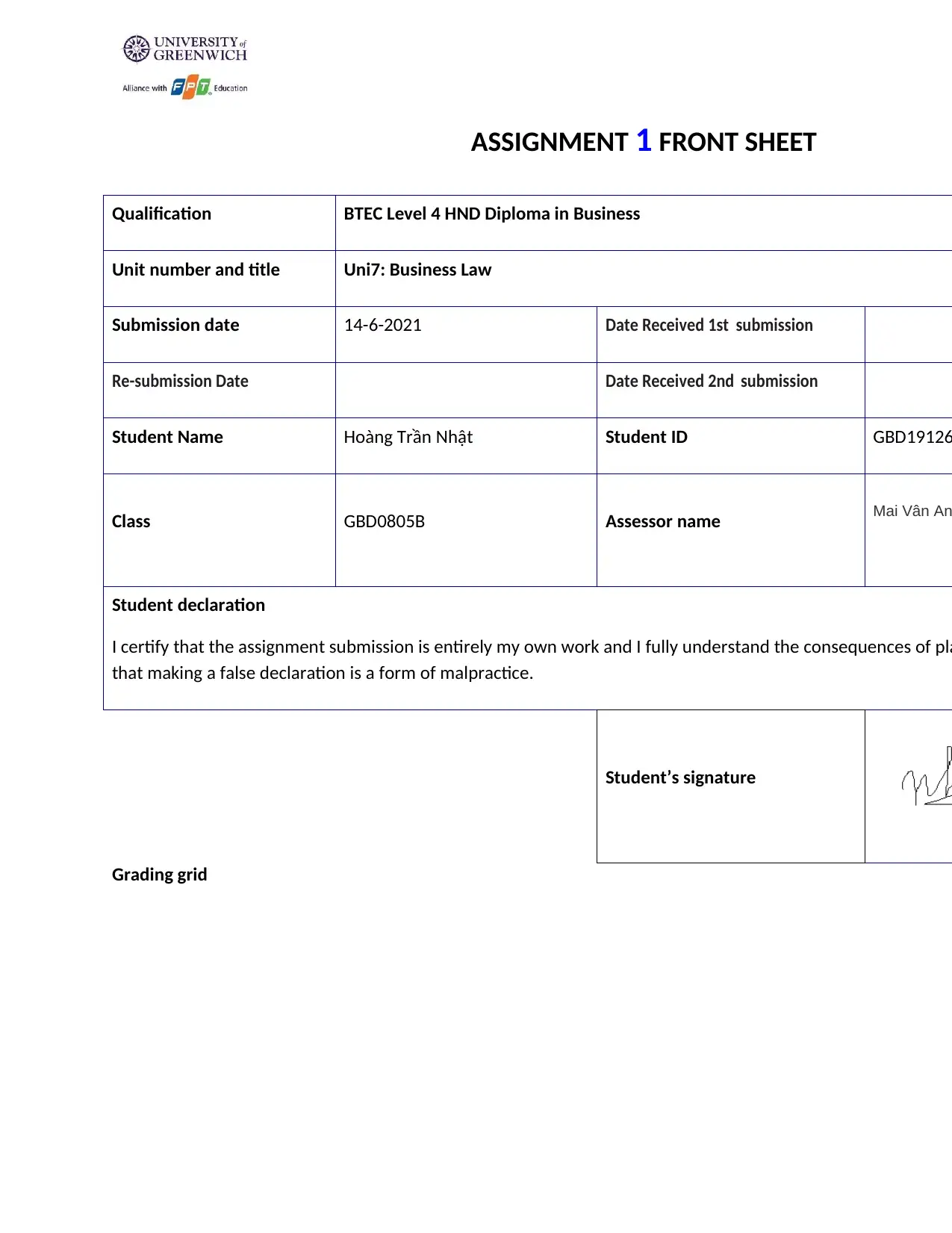
ASSIGNMENT 1 FRONT SHEET
Qualification BTEC Level 4 HND Diploma in Business
Unit number and title Uni7: Business Law
Submission date 14-6-2021 Date Received 1st submission
Re-submission Date Date Received 2nd submission
Student Name Hoàng Trần Nhật Student ID GBD19126
Class GBD0805B Assessor name Mai Vân An
Student declaration
I certify that the assignment submission is entirely my own work and I fully understand the consequences of pla
that making a false declaration is a form of malpractice.
Student’s signature
Grading grid
Qualification BTEC Level 4 HND Diploma in Business
Unit number and title Uni7: Business Law
Submission date 14-6-2021 Date Received 1st submission
Re-submission Date Date Received 2nd submission
Student Name Hoàng Trần Nhật Student ID GBD19126
Class GBD0805B Assessor name Mai Vân An
Student declaration
I certify that the assignment submission is entirely my own work and I fully understand the consequences of pla
that making a false declaration is a form of malpractice.
Student’s signature
Grading grid
Paraphrase This Document
Need a fresh take? Get an instant paraphrase of this document with our AI Paraphraser

P1 P2 M1 D1
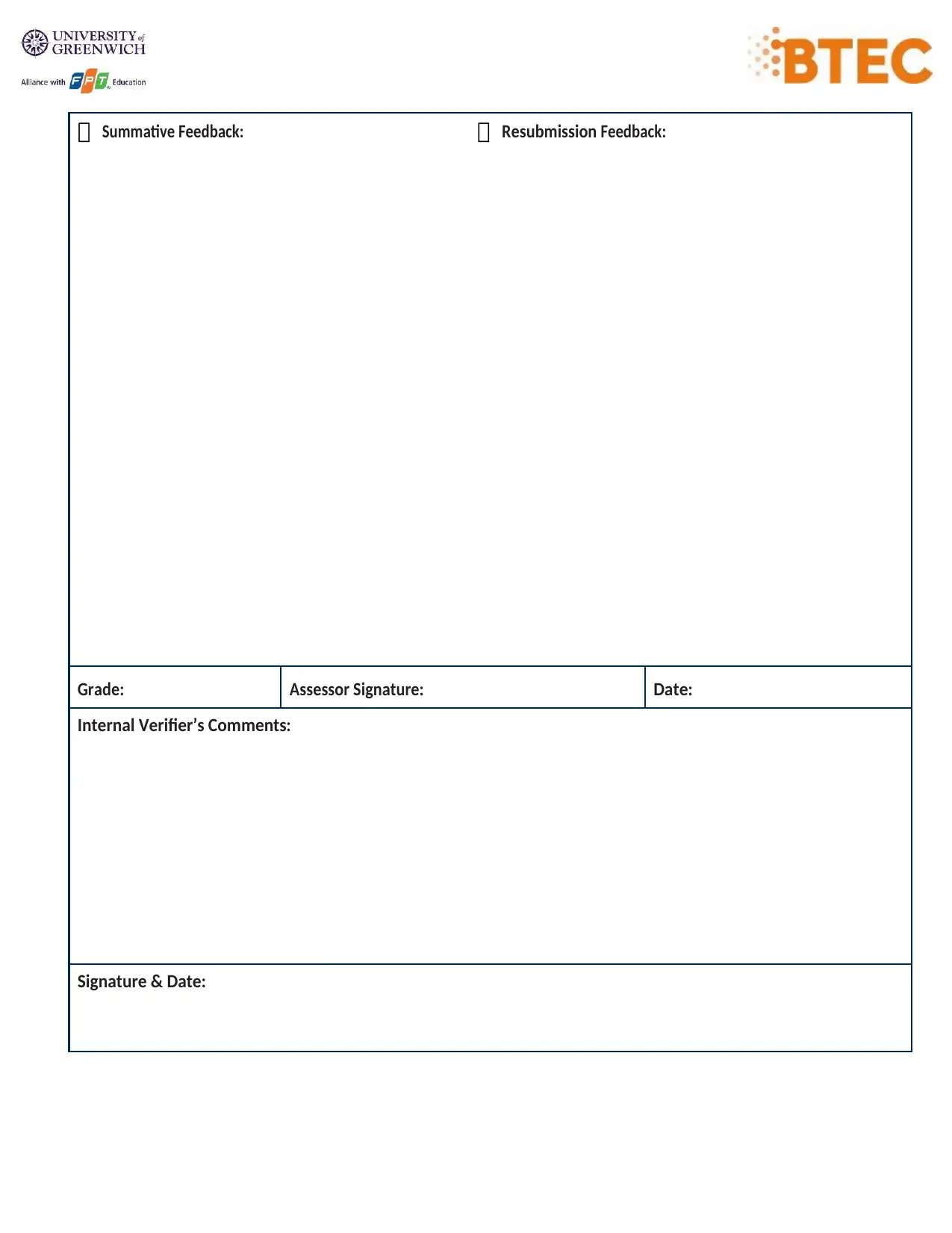
Summative Feedback: Resubmission Feedback:
Grade: Assessor Signature: Date:
Internal Verifier’s Comments:
Signature & Date:
Grade: Assessor Signature: Date:
Internal Verifier’s Comments:
Signature & Date:
⊘ This is a preview!⊘
Do you want full access?
Subscribe today to unlock all pages.

Trusted by 1+ million students worldwide
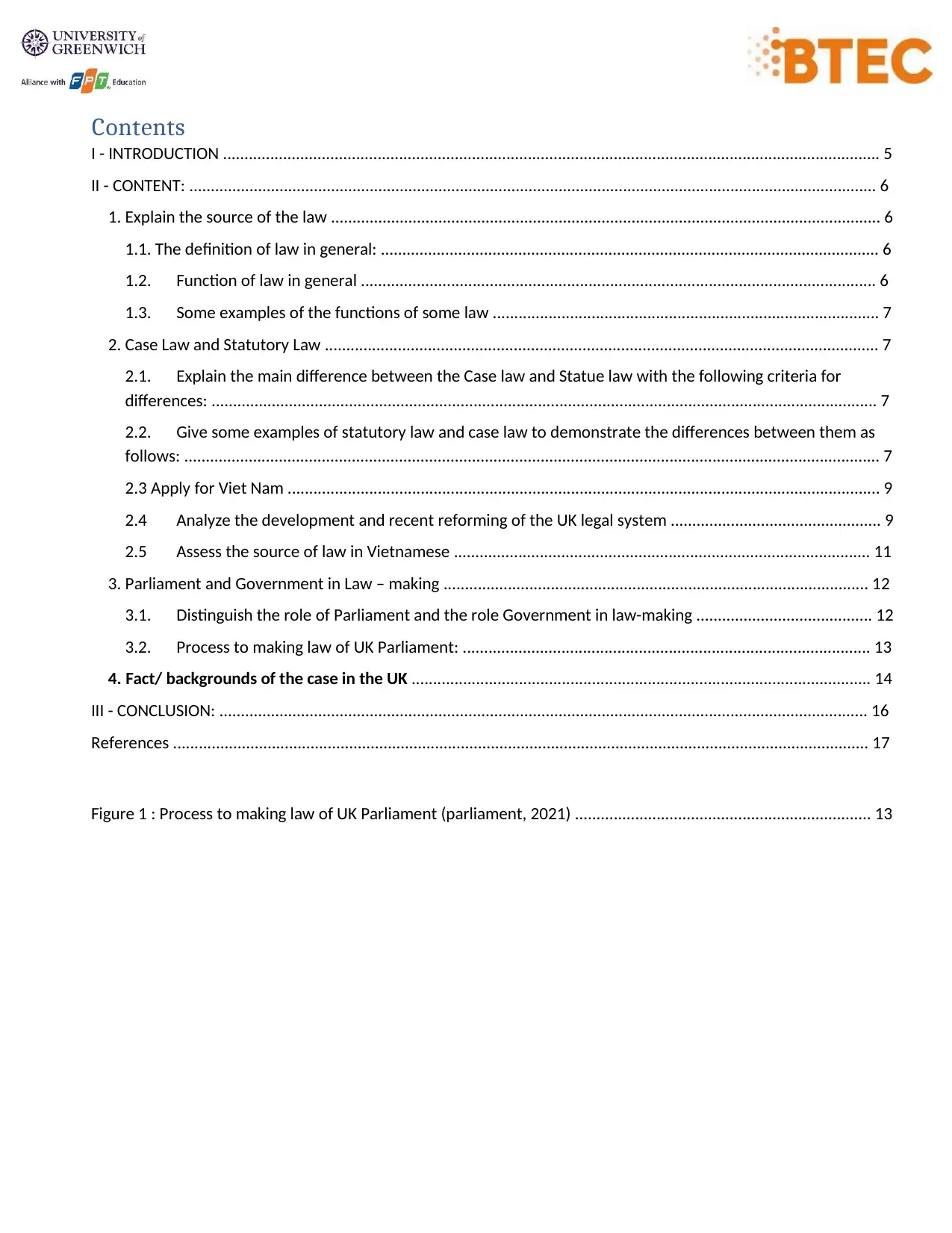
Contents
I - INTRODUCTION ......................................................................................................................................................... 5
II - CONTENT: ................................................................................................................................................................ 6
1. Explain the source of the law ................................................................................................................................ 6
1.1. The definition of law in general: .................................................................................................................... 6
1.2. Function of law in general ........................................................................................................................ 6
1.3. Some examples of the functions of some law .......................................................................................... 7
2. Case Law and Statutory Law ................................................................................................................................. 7
2.1. Explain the main difference between the Case law and Statue law with the following criteria for
differences: ........................................................................................................................................................... 7
2.2. Give some examples of statutory law and case law to demonstrate the differences between them as
follows: .................................................................................................................................................................. 7
2.3 Apply for Viet Nam .......................................................................................................................................... 9
2.4 Analyze the development and recent reforming of the UK legal system ................................................. 9
2.5 Assess the source of law in Vietnamese ................................................................................................. 11
3. Parliament and Government in Law – making ................................................................................................... 12
3.1. Distinguish the role of Parliament and the role Government in law-making ......................................... 12
3.2. Process to making law of UK Parliament: ............................................................................................... 13
4. Fact/ backgrounds of the case in the UK ........................................................................................................... 14
III - CONCLUSION: ....................................................................................................................................................... 16
References .................................................................................................................................................................. 17
Figure 1 : Process to making law of UK Parliament (parliament, 2021) ..................................................................... 13
I - INTRODUCTION ......................................................................................................................................................... 5
II - CONTENT: ................................................................................................................................................................ 6
1. Explain the source of the law ................................................................................................................................ 6
1.1. The definition of law in general: .................................................................................................................... 6
1.2. Function of law in general ........................................................................................................................ 6
1.3. Some examples of the functions of some law .......................................................................................... 7
2. Case Law and Statutory Law ................................................................................................................................. 7
2.1. Explain the main difference between the Case law and Statue law with the following criteria for
differences: ........................................................................................................................................................... 7
2.2. Give some examples of statutory law and case law to demonstrate the differences between them as
follows: .................................................................................................................................................................. 7
2.3 Apply for Viet Nam .......................................................................................................................................... 9
2.4 Analyze the development and recent reforming of the UK legal system ................................................. 9
2.5 Assess the source of law in Vietnamese ................................................................................................. 11
3. Parliament and Government in Law – making ................................................................................................... 12
3.1. Distinguish the role of Parliament and the role Government in law-making ......................................... 12
3.2. Process to making law of UK Parliament: ............................................................................................... 13
4. Fact/ backgrounds of the case in the UK ........................................................................................................... 14
III - CONCLUSION: ....................................................................................................................................................... 16
References .................................................................................................................................................................. 17
Figure 1 : Process to making law of UK Parliament (parliament, 2021) ..................................................................... 13
Paraphrase This Document
Need a fresh take? Get an instant paraphrase of this document with our AI Paraphraser
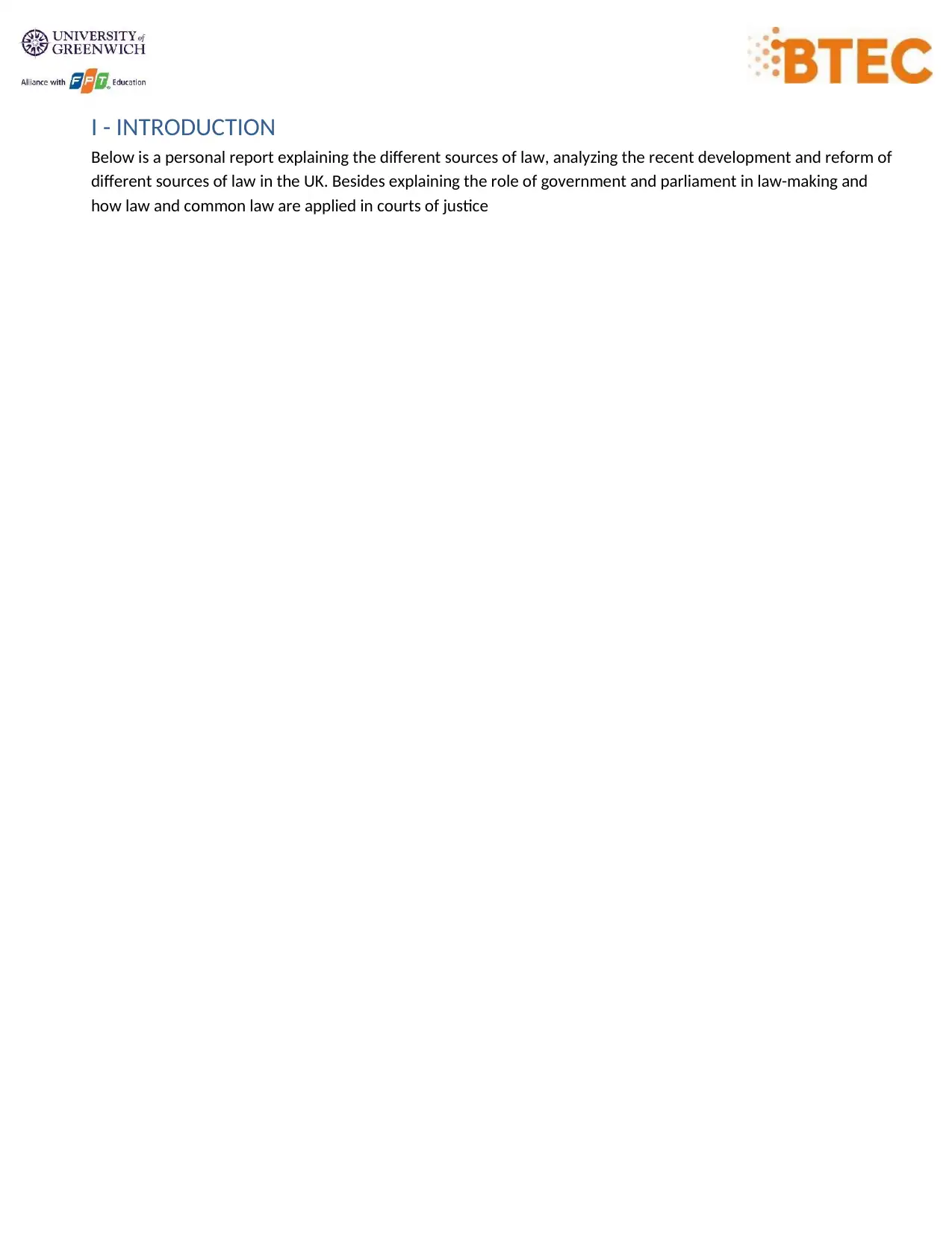
I - INTRODUCTION
Below is a personal report explaining the different sources of law, analyzing the recent development and reform of
different sources of law in the UK. Besides explaining the role of government and parliament in law-making and
how law and common law are applied in courts of justice
Below is a personal report explaining the different sources of law, analyzing the recent development and reform of
different sources of law in the UK. Besides explaining the role of government and parliament in law-making and
how law and common law are applied in courts of justice
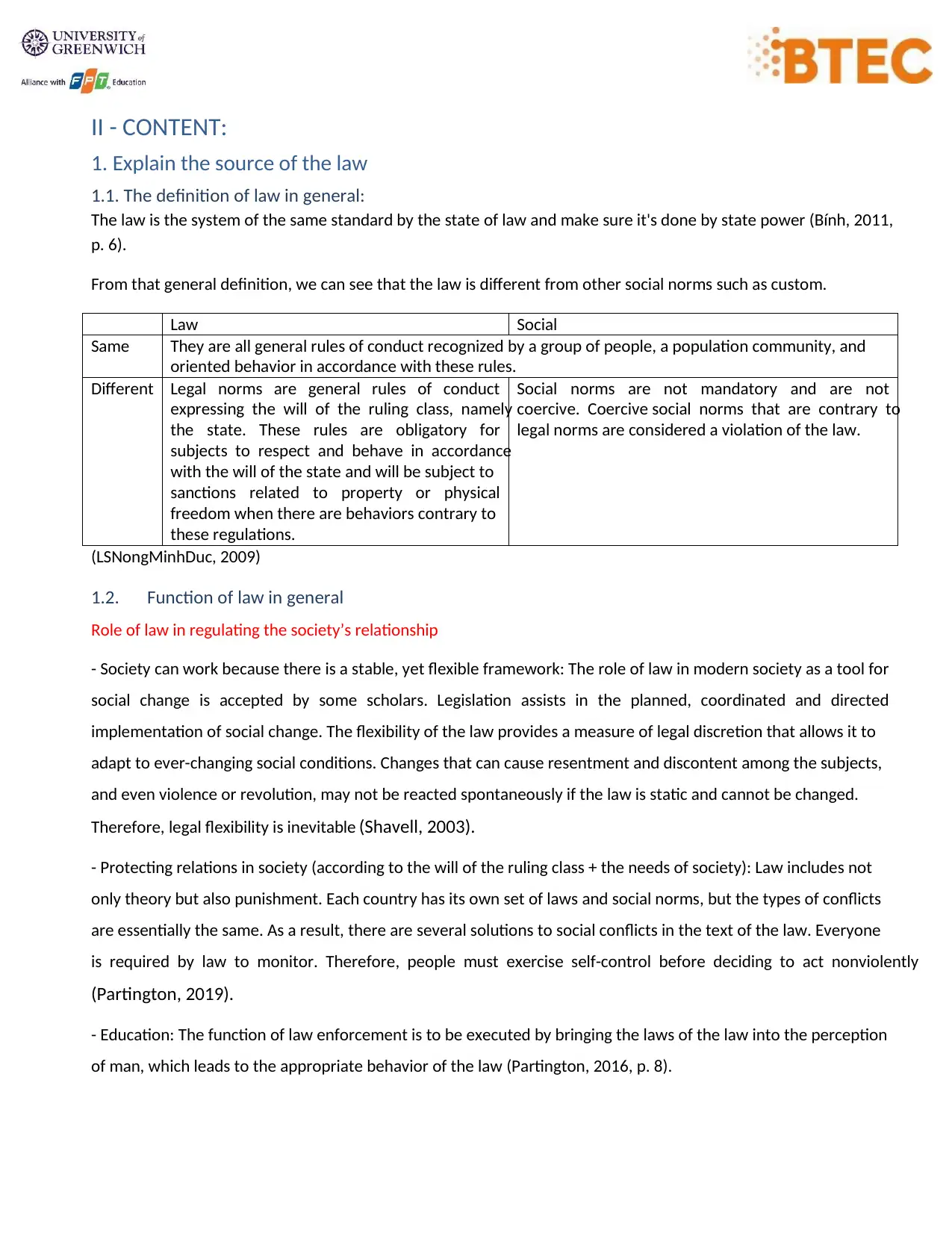
II - CONTENT:
1. Explain the source of the law
1.1. The definition of law in general:
The law is the system of the same standard by the state of law and make sure it's done by state power (Bính, 2011,
p. 6).
From that general definition, we can see that the law is different from other social norms such as custom.
Law Social
Same They are all general rules of conduct recognized by a group of people, a population community, and
oriented behavior in accordance with these rules.
Different Legal norms are general rules of conduct
expressing the will of the ruling class, namely
the state. These rules are obligatory for
subjects to respect and behave in accordance
with the will of the state and will be subject to
sanctions related to property or physical
freedom when there are behaviors contrary to
these regulations.
Social norms are not mandatory and are not
coercive. Coercive social norms that are contrary to
legal norms are considered a violation of the law.
(LSNongMinhDuc, 2009)
1.2. Function of law in general
Role of law in regulating the society’s relationship
- Society can work because there is a stable, yet flexible framework: The role of law in modern society as a tool for
social change is accepted by some scholars. Legislation assists in the planned, coordinated and directed
implementation of social change. The flexibility of the law provides a measure of legal discretion that allows it to
adapt to ever-changing social conditions. Changes that can cause resentment and discontent among the subjects,
and even violence or revolution, may not be reacted spontaneously if the law is static and cannot be changed.
Therefore, legal flexibility is inevitable (Shavell, 2003).
- Protecting relations in society (according to the will of the ruling class + the needs of society): Law includes not
only theory but also punishment. Each country has its own set of laws and social norms, but the types of conflicts
are essentially the same. As a result, there are several solutions to social conflicts in the text of the law. Everyone
is required by law to monitor. Therefore, people must exercise self-control before deciding to act nonviolently
(Partington, 2019).
- Education: The function of law enforcement is to be executed by bringing the laws of the law into the perception
of man, which leads to the appropriate behavior of the law (Partington, 2016, p. 8).
1. Explain the source of the law
1.1. The definition of law in general:
The law is the system of the same standard by the state of law and make sure it's done by state power (Bính, 2011,
p. 6).
From that general definition, we can see that the law is different from other social norms such as custom.
Law Social
Same They are all general rules of conduct recognized by a group of people, a population community, and
oriented behavior in accordance with these rules.
Different Legal norms are general rules of conduct
expressing the will of the ruling class, namely
the state. These rules are obligatory for
subjects to respect and behave in accordance
with the will of the state and will be subject to
sanctions related to property or physical
freedom when there are behaviors contrary to
these regulations.
Social norms are not mandatory and are not
coercive. Coercive social norms that are contrary to
legal norms are considered a violation of the law.
(LSNongMinhDuc, 2009)
1.2. Function of law in general
Role of law in regulating the society’s relationship
- Society can work because there is a stable, yet flexible framework: The role of law in modern society as a tool for
social change is accepted by some scholars. Legislation assists in the planned, coordinated and directed
implementation of social change. The flexibility of the law provides a measure of legal discretion that allows it to
adapt to ever-changing social conditions. Changes that can cause resentment and discontent among the subjects,
and even violence or revolution, may not be reacted spontaneously if the law is static and cannot be changed.
Therefore, legal flexibility is inevitable (Shavell, 2003).
- Protecting relations in society (according to the will of the ruling class + the needs of society): Law includes not
only theory but also punishment. Each country has its own set of laws and social norms, but the types of conflicts
are essentially the same. As a result, there are several solutions to social conflicts in the text of the law. Everyone
is required by law to monitor. Therefore, people must exercise self-control before deciding to act nonviolently
(Partington, 2019).
- Education: The function of law enforcement is to be executed by bringing the laws of the law into the perception
of man, which leads to the appropriate behavior of the law (Partington, 2016, p. 8).
⊘ This is a preview!⊘
Do you want full access?
Subscribe today to unlock all pages.

Trusted by 1+ million students worldwide
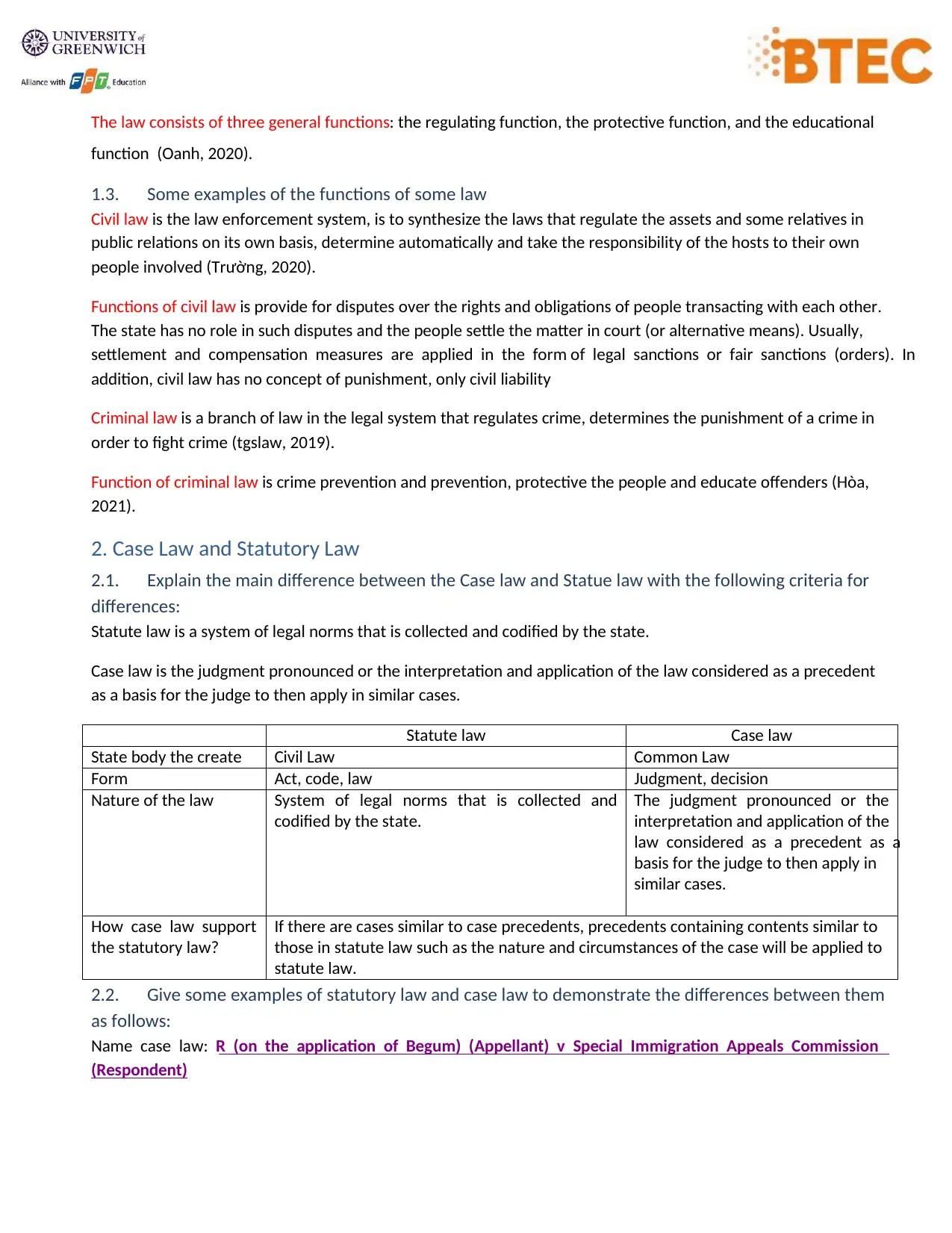
The law consists of three general functions: the regulating function, the protective function, and the educational
function (Oanh, 2020).
1.3. Some examples of the functions of some law
Civil law is the law enforcement system, is to synthesize the laws that regulate the assets and some relatives in
public relations on its own basis, determine automatically and take the responsibility of the hosts to their own
people involved (Trường, 2020).
Functions of civil law is provide for disputes over the rights and obligations of people transacting with each other.
The state has no role in such disputes and the people settle the matter in court (or alternative means). Usually,
settlement and compensation measures are applied in the form of legal sanctions or fair sanctions (orders). In
addition, civil law has no concept of punishment, only civil liability
Criminal law is a branch of law in the legal system that regulates crime, determines the punishment of a crime in
order to fight crime (tgslaw, 2019).
Function of criminal law is crime prevention and prevention, protective the people and educate offenders (Hòa,
2021).
2. Case Law and Statutory Law
2.1. Explain the main difference between the Case law and Statue law with the following criteria for
differences:
Statute law is a system of legal norms that is collected and codified by the state.
Case law is the judgment pronounced or the interpretation and application of the law considered as a precedent
as a basis for the judge to then apply in similar cases.
Statute law Case law
State body the create Civil Law Common Law
Form Act, code, law Judgment, decision
Nature of the law System of legal norms that is collected and
codified by the state.
The judgment pronounced or the
interpretation and application of the
law considered as a precedent as a
basis for the judge to then apply in
similar cases.
How case law support
the statutory law?
If there are cases similar to case precedents, precedents containing contents similar to
those in statute law such as the nature and circumstances of the case will be applied to
statute law.
2.2. Give some examples of statutory law and case law to demonstrate the differences between them
as follows:
Name case law: R (on the application of Begum) (Appellant) v Special Immigration Appeals Commission
(Respondent)
function (Oanh, 2020).
1.3. Some examples of the functions of some law
Civil law is the law enforcement system, is to synthesize the laws that regulate the assets and some relatives in
public relations on its own basis, determine automatically and take the responsibility of the hosts to their own
people involved (Trường, 2020).
Functions of civil law is provide for disputes over the rights and obligations of people transacting with each other.
The state has no role in such disputes and the people settle the matter in court (or alternative means). Usually,
settlement and compensation measures are applied in the form of legal sanctions or fair sanctions (orders). In
addition, civil law has no concept of punishment, only civil liability
Criminal law is a branch of law in the legal system that regulates crime, determines the punishment of a crime in
order to fight crime (tgslaw, 2019).
Function of criminal law is crime prevention and prevention, protective the people and educate offenders (Hòa,
2021).
2. Case Law and Statutory Law
2.1. Explain the main difference between the Case law and Statue law with the following criteria for
differences:
Statute law is a system of legal norms that is collected and codified by the state.
Case law is the judgment pronounced or the interpretation and application of the law considered as a precedent
as a basis for the judge to then apply in similar cases.
Statute law Case law
State body the create Civil Law Common Law
Form Act, code, law Judgment, decision
Nature of the law System of legal norms that is collected and
codified by the state.
The judgment pronounced or the
interpretation and application of the
law considered as a precedent as a
basis for the judge to then apply in
similar cases.
How case law support
the statutory law?
If there are cases similar to case precedents, precedents containing contents similar to
those in statute law such as the nature and circumstances of the case will be applied to
statute law.
2.2. Give some examples of statutory law and case law to demonstrate the differences between them
as follows:
Name case law: R (on the application of Begum) (Appellant) v Special Immigration Appeals Commission
(Respondent)
Paraphrase This Document
Need a fresh take? Get an instant paraphrase of this document with our AI Paraphraser
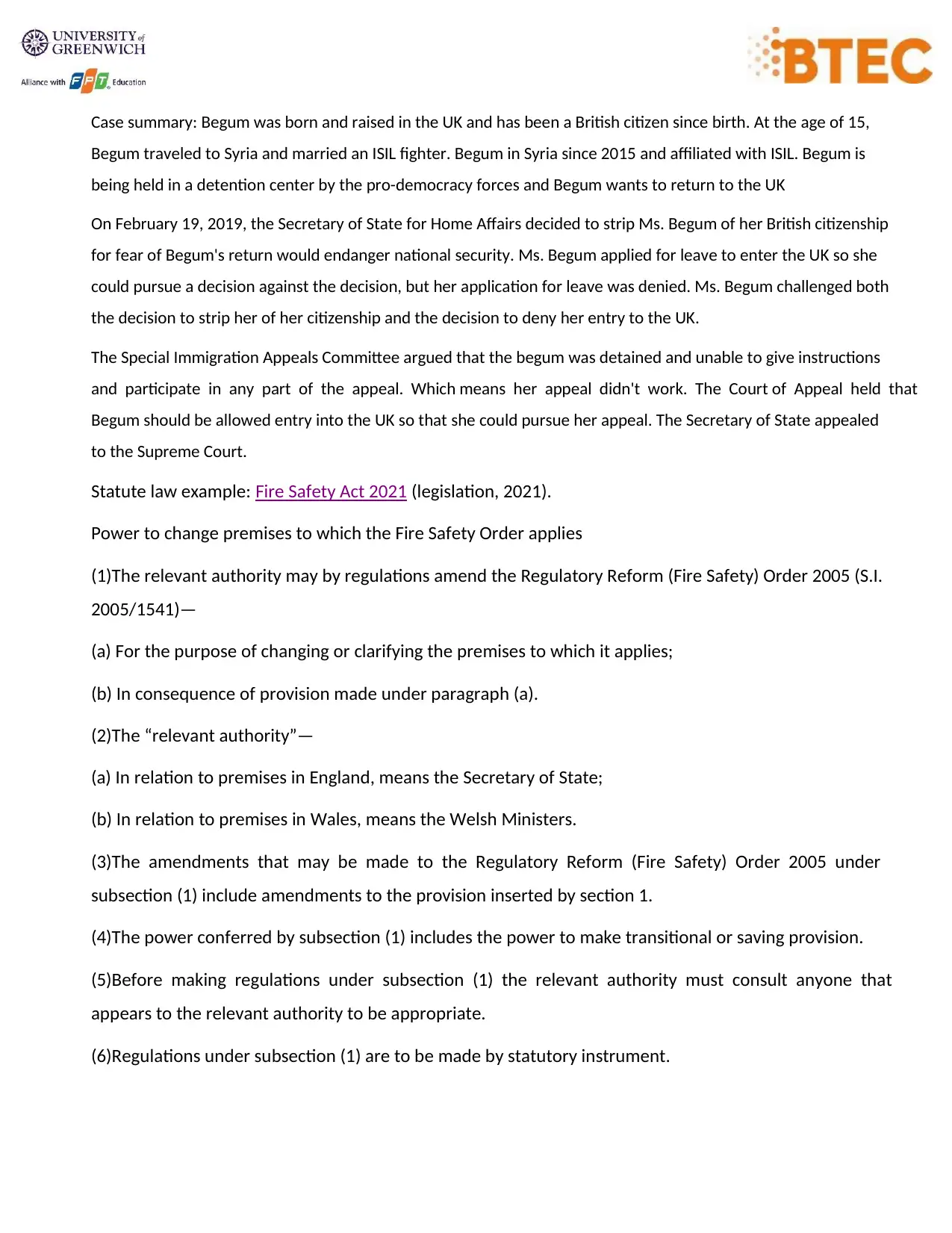
Case summary: Begum was born and raised in the UK and has been a British citizen since birth. At the age of 15,
Begum traveled to Syria and married an ISIL fighter. Begum in Syria since 2015 and affiliated with ISIL. Begum is
being held in a detention center by the pro-democracy forces and Begum wants to return to the UK
On February 19, 2019, the Secretary of State for Home Affairs decided to strip Ms. Begum of her British citizenship
for fear of Begum's return would endanger national security. Ms. Begum applied for leave to enter the UK so she
could pursue a decision against the decision, but her application for leave was denied. Ms. Begum challenged both
the decision to strip her of her citizenship and the decision to deny her entry to the UK.
The Special Immigration Appeals Committee argued that the begum was detained and unable to give instructions
and participate in any part of the appeal. Which means her appeal didn't work. The Court of Appeal held that
Begum should be allowed entry into the UK so that she could pursue her appeal. The Secretary of State appealed
to the Supreme Court.
Statute law example: Fire Safety Act 2021 (legislation, 2021).
Power to change premises to which the Fire Safety Order applies
(1)The relevant authority may by regulations amend the Regulatory Reform (Fire Safety) Order 2005 (S.I.
2005/1541)—
(a) For the purpose of changing or clarifying the premises to which it applies;
(b) In consequence of provision made under paragraph (a).
(2)The “relevant authority”—
(a) In relation to premises in England, means the Secretary of State;
(b) In relation to premises in Wales, means the Welsh Ministers.
(3)The amendments that may be made to the Regulatory Reform (Fire Safety) Order 2005 under
subsection (1) include amendments to the provision inserted by section 1.
(4)The power conferred by subsection (1) includes the power to make transitional or saving provision.
(5)Before making regulations under subsection (1) the relevant authority must consult anyone that
appears to the relevant authority to be appropriate.
(6)Regulations under subsection (1) are to be made by statutory instrument.
Begum traveled to Syria and married an ISIL fighter. Begum in Syria since 2015 and affiliated with ISIL. Begum is
being held in a detention center by the pro-democracy forces and Begum wants to return to the UK
On February 19, 2019, the Secretary of State for Home Affairs decided to strip Ms. Begum of her British citizenship
for fear of Begum's return would endanger national security. Ms. Begum applied for leave to enter the UK so she
could pursue a decision against the decision, but her application for leave was denied. Ms. Begum challenged both
the decision to strip her of her citizenship and the decision to deny her entry to the UK.
The Special Immigration Appeals Committee argued that the begum was detained and unable to give instructions
and participate in any part of the appeal. Which means her appeal didn't work. The Court of Appeal held that
Begum should be allowed entry into the UK so that she could pursue her appeal. The Secretary of State appealed
to the Supreme Court.
Statute law example: Fire Safety Act 2021 (legislation, 2021).
Power to change premises to which the Fire Safety Order applies
(1)The relevant authority may by regulations amend the Regulatory Reform (Fire Safety) Order 2005 (S.I.
2005/1541)—
(a) For the purpose of changing or clarifying the premises to which it applies;
(b) In consequence of provision made under paragraph (a).
(2)The “relevant authority”—
(a) In relation to premises in England, means the Secretary of State;
(b) In relation to premises in Wales, means the Welsh Ministers.
(3)The amendments that may be made to the Regulatory Reform (Fire Safety) Order 2005 under
subsection (1) include amendments to the provision inserted by section 1.
(4)The power conferred by subsection (1) includes the power to make transitional or saving provision.
(5)Before making regulations under subsection (1) the relevant authority must consult anyone that
appears to the relevant authority to be appropriate.
(6)Regulations under subsection (1) are to be made by statutory instrument.
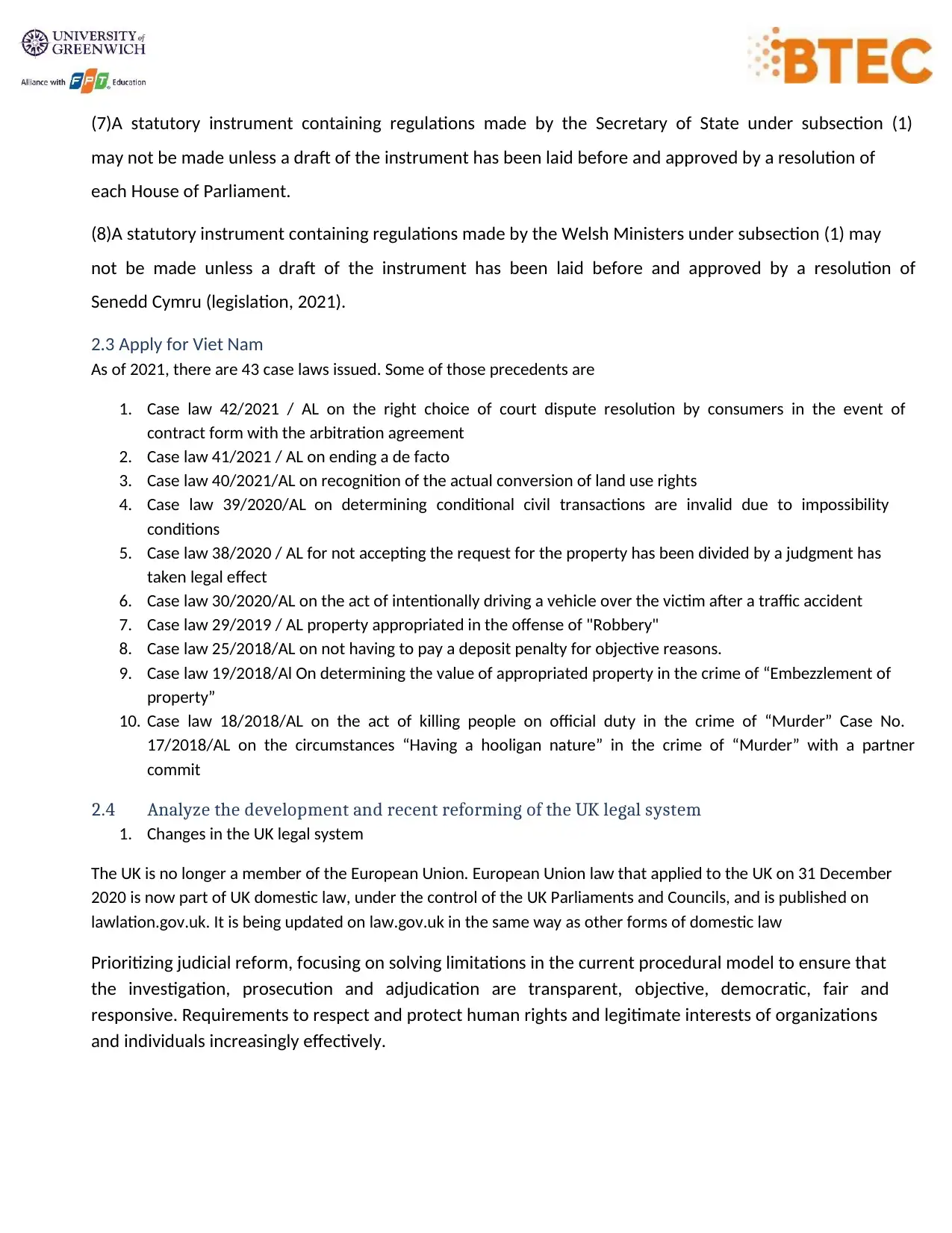
(7)A statutory instrument containing regulations made by the Secretary of State under subsection (1)
may not be made unless a draft of the instrument has been laid before and approved by a resolution of
each House of Parliament.
(8)A statutory instrument containing regulations made by the Welsh Ministers under subsection (1) may
not be made unless a draft of the instrument has been laid before and approved by a resolution of
Senedd Cymru (legislation, 2021).
2.3 Apply for Viet Nam
As of 2021, there are 43 case laws issued. Some of those precedents are
1. Case law 42/2021 / AL on the right choice of court dispute resolution by consumers in the event of
contract form with the arbitration agreement
2. Case law 41/2021 / AL on ending a de facto
3. Case law 40/2021/AL on recognition of the actual conversion of land use rights
4. Case law 39/2020/AL on determining conditional civil transactions are invalid due to impossibility
conditions
5. Case law 38/2020 / AL for not accepting the request for the property has been divided by a judgment has
taken legal effect
6. Case law 30/2020/AL on the act of intentionally driving a vehicle over the victim after a traffic accident
7. Case law 29/2019 / AL property appropriated in the offense of "Robbery"
8. Case law 25/2018/AL on not having to pay a deposit penalty for objective reasons.
9. Case law 19/2018/Al On determining the value of appropriated property in the crime of “Embezzlement of
property”
10. Case law 18/2018/AL on the act of killing people on official duty in the crime of “Murder” Case No.
17/2018/AL on the circumstances “Having a hooligan nature” in the crime of “Murder” with a partner
commit
2.4 Analyze the development and recent reforming of the UK legal system
1. Changes in the UK legal system
The UK is no longer a member of the European Union. European Union law that applied to the UK on 31 December
2020 is now part of UK domestic law, under the control of the UK Parliaments and Councils, and is published on
lawlation.gov.uk. It is being updated on law.gov.uk in the same way as other forms of domestic law
Prioritizing judicial reform, focusing on solving limitations in the current procedural model to ensure that
the investigation, prosecution and adjudication are transparent, objective, democratic, fair and
responsive. Requirements to respect and protect human rights and legitimate interests of organizations
and individuals increasingly effectively.
may not be made unless a draft of the instrument has been laid before and approved by a resolution of
each House of Parliament.
(8)A statutory instrument containing regulations made by the Welsh Ministers under subsection (1) may
not be made unless a draft of the instrument has been laid before and approved by a resolution of
Senedd Cymru (legislation, 2021).
2.3 Apply for Viet Nam
As of 2021, there are 43 case laws issued. Some of those precedents are
1. Case law 42/2021 / AL on the right choice of court dispute resolution by consumers in the event of
contract form with the arbitration agreement
2. Case law 41/2021 / AL on ending a de facto
3. Case law 40/2021/AL on recognition of the actual conversion of land use rights
4. Case law 39/2020/AL on determining conditional civil transactions are invalid due to impossibility
conditions
5. Case law 38/2020 / AL for not accepting the request for the property has been divided by a judgment has
taken legal effect
6. Case law 30/2020/AL on the act of intentionally driving a vehicle over the victim after a traffic accident
7. Case law 29/2019 / AL property appropriated in the offense of "Robbery"
8. Case law 25/2018/AL on not having to pay a deposit penalty for objective reasons.
9. Case law 19/2018/Al On determining the value of appropriated property in the crime of “Embezzlement of
property”
10. Case law 18/2018/AL on the act of killing people on official duty in the crime of “Murder” Case No.
17/2018/AL on the circumstances “Having a hooligan nature” in the crime of “Murder” with a partner
commit
2.4 Analyze the development and recent reforming of the UK legal system
1. Changes in the UK legal system
The UK is no longer a member of the European Union. European Union law that applied to the UK on 31 December
2020 is now part of UK domestic law, under the control of the UK Parliaments and Councils, and is published on
lawlation.gov.uk. It is being updated on law.gov.uk in the same way as other forms of domestic law
Prioritizing judicial reform, focusing on solving limitations in the current procedural model to ensure that
the investigation, prosecution and adjudication are transparent, objective, democratic, fair and
responsive. Requirements to respect and protect human rights and legitimate interests of organizations
and individuals increasingly effectively.
⊘ This is a preview!⊘
Do you want full access?
Subscribe today to unlock all pages.

Trusted by 1+ million students worldwide
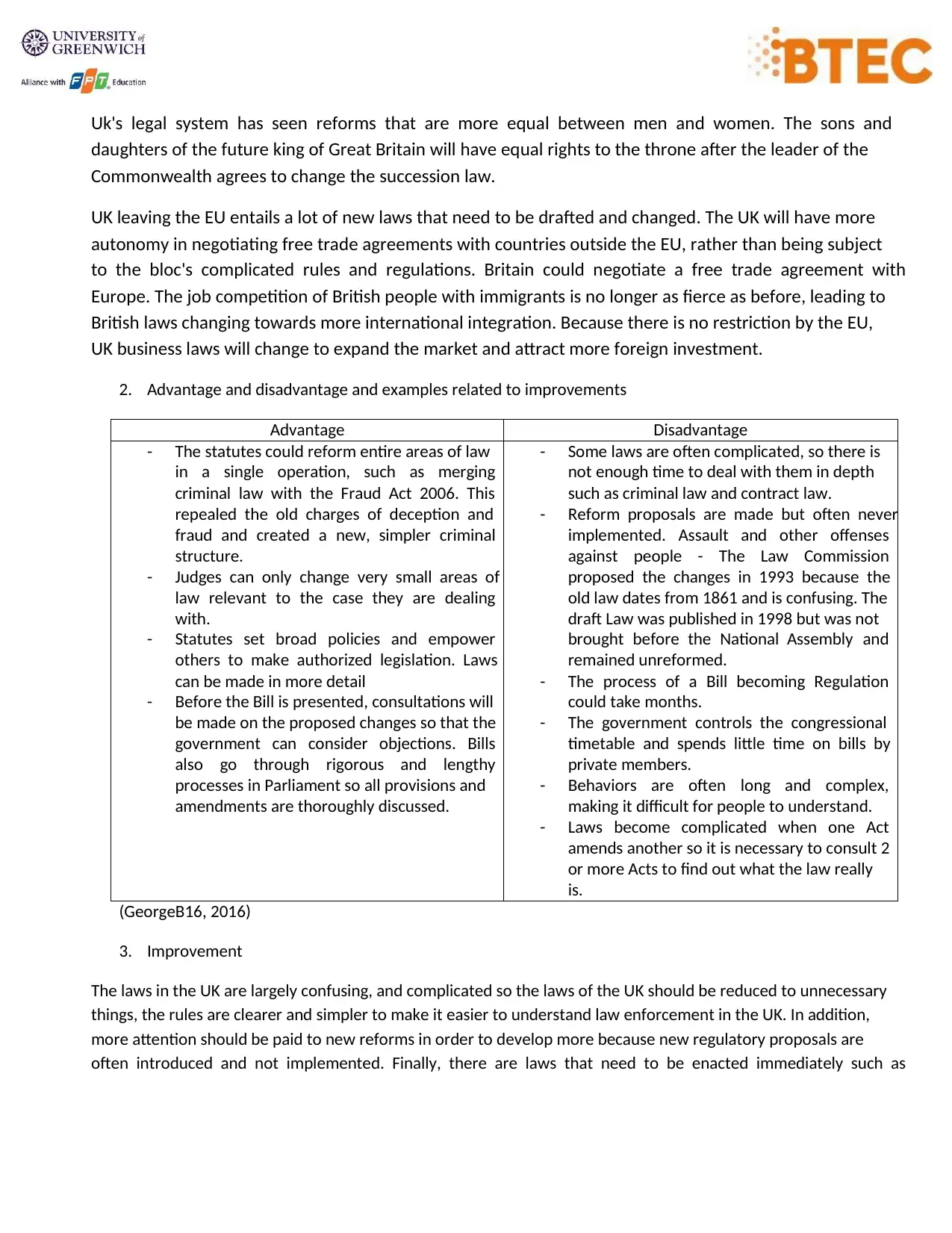
Uk's legal system has seen reforms that are more equal between men and women. The sons and
daughters of the future king of Great Britain will have equal rights to the throne after the leader of the
Commonwealth agrees to change the succession law.
UK leaving the EU entails a lot of new laws that need to be drafted and changed. The UK will have more
autonomy in negotiating free trade agreements with countries outside the EU, rather than being subject
to the bloc's complicated rules and regulations. Britain could negotiate a free trade agreement with
Europe. The job competition of British people with immigrants is no longer as fierce as before, leading to
British laws changing towards more international integration. Because there is no restriction by the EU,
UK business laws will change to expand the market and attract more foreign investment.
2. Advantage and disadvantage and examples related to improvements
Advantage Disadvantage
- The statutes could reform entire areas of law
in a single operation, such as merging
criminal law with the Fraud Act 2006. This
repealed the old charges of deception and
fraud and created a new, simpler criminal
structure.
- Judges can only change very small areas of
law relevant to the case they are dealing
with.
- Statutes set broad policies and empower
others to make authorized legislation. Laws
can be made in more detail
- Before the Bill is presented, consultations will
be made on the proposed changes so that the
government can consider objections. Bills
also go through rigorous and lengthy
processes in Parliament so all provisions and
amendments are thoroughly discussed.
- Some laws are often complicated, so there is
not enough time to deal with them in depth
such as criminal law and contract law.
- Reform proposals are made but often never
implemented. Assault and other offenses
against people - The Law Commission
proposed the changes in 1993 because the
old law dates from 1861 and is confusing. The
draft Law was published in 1998 but was not
brought before the National Assembly and
remained unreformed.
- The process of a Bill becoming Regulation
could take months.
- The government controls the congressional
timetable and spends little time on bills by
private members.
- Behaviors are often long and complex,
making it difficult for people to understand.
- Laws become complicated when one Act
amends another so it is necessary to consult 2
or more Acts to find out what the law really
is.
(GeorgeB16, 2016)
3. Improvement
The laws in the UK are largely confusing, and complicated so the laws of the UK should be reduced to unnecessary
things, the rules are clearer and simpler to make it easier to understand law enforcement in the UK. In addition,
more attention should be paid to new reforms in order to develop more because new regulatory proposals are
often introduced and not implemented. Finally, there are laws that need to be enacted immediately such as
daughters of the future king of Great Britain will have equal rights to the throne after the leader of the
Commonwealth agrees to change the succession law.
UK leaving the EU entails a lot of new laws that need to be drafted and changed. The UK will have more
autonomy in negotiating free trade agreements with countries outside the EU, rather than being subject
to the bloc's complicated rules and regulations. Britain could negotiate a free trade agreement with
Europe. The job competition of British people with immigrants is no longer as fierce as before, leading to
British laws changing towards more international integration. Because there is no restriction by the EU,
UK business laws will change to expand the market and attract more foreign investment.
2. Advantage and disadvantage and examples related to improvements
Advantage Disadvantage
- The statutes could reform entire areas of law
in a single operation, such as merging
criminal law with the Fraud Act 2006. This
repealed the old charges of deception and
fraud and created a new, simpler criminal
structure.
- Judges can only change very small areas of
law relevant to the case they are dealing
with.
- Statutes set broad policies and empower
others to make authorized legislation. Laws
can be made in more detail
- Before the Bill is presented, consultations will
be made on the proposed changes so that the
government can consider objections. Bills
also go through rigorous and lengthy
processes in Parliament so all provisions and
amendments are thoroughly discussed.
- Some laws are often complicated, so there is
not enough time to deal with them in depth
such as criminal law and contract law.
- Reform proposals are made but often never
implemented. Assault and other offenses
against people - The Law Commission
proposed the changes in 1993 because the
old law dates from 1861 and is confusing. The
draft Law was published in 1998 but was not
brought before the National Assembly and
remained unreformed.
- The process of a Bill becoming Regulation
could take months.
- The government controls the congressional
timetable and spends little time on bills by
private members.
- Behaviors are often long and complex,
making it difficult for people to understand.
- Laws become complicated when one Act
amends another so it is necessary to consult 2
or more Acts to find out what the law really
is.
(GeorgeB16, 2016)
3. Improvement
The laws in the UK are largely confusing, and complicated so the laws of the UK should be reduced to unnecessary
things, the rules are clearer and simpler to make it easier to understand law enforcement in the UK. In addition,
more attention should be paid to new reforms in order to develop more because new regulatory proposals are
often introduced and not implemented. Finally, there are laws that need to be enacted immediately such as
Paraphrase This Document
Need a fresh take? Get an instant paraphrase of this document with our AI Paraphraser
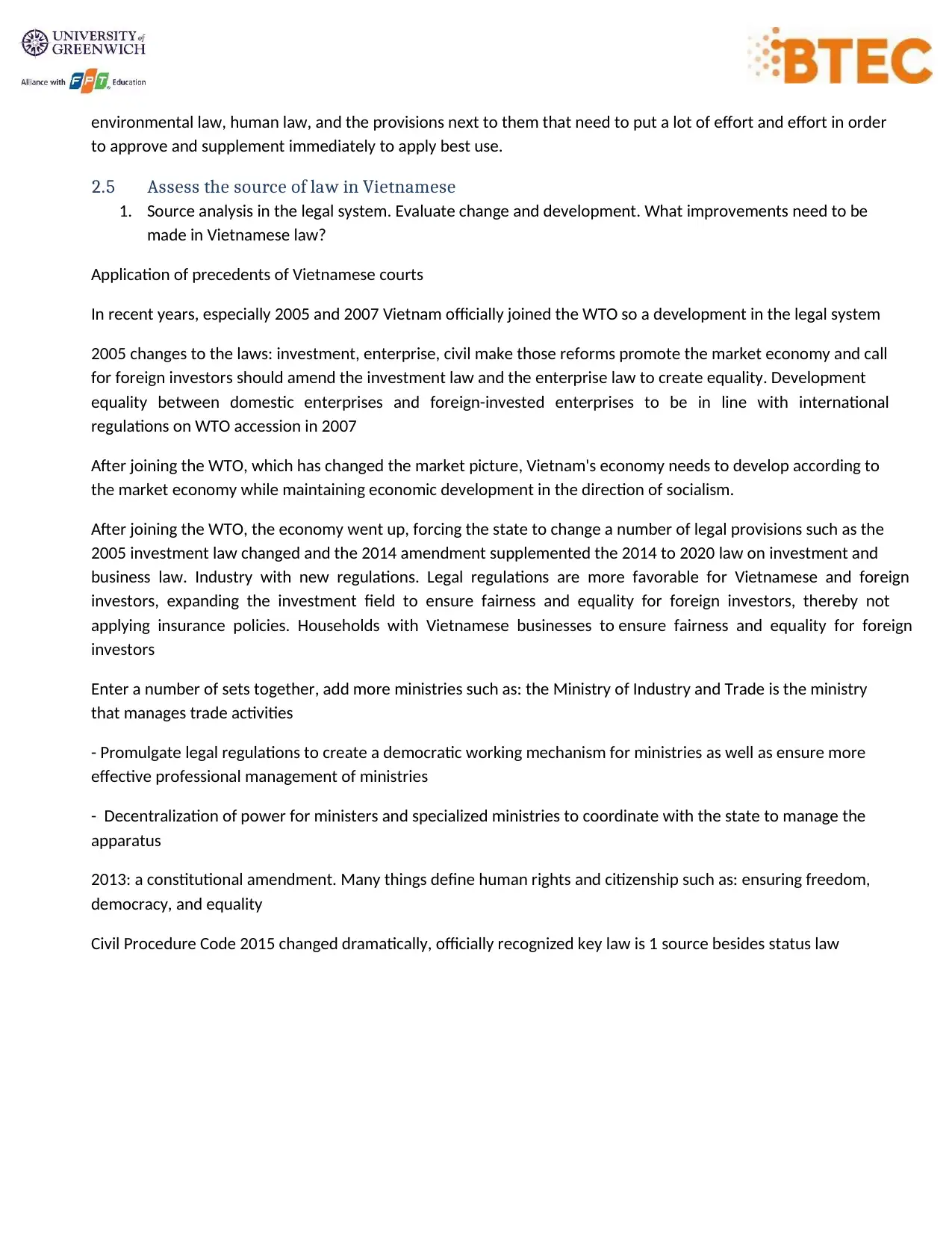
environmental law, human law, and the provisions next to them that need to put a lot of effort and effort in order
to approve and supplement immediately to apply best use.
2.5 Assess the source of law in Vietnamese
1. Source analysis in the legal system. Evaluate change and development. What improvements need to be
made in Vietnamese law?
Application of precedents of Vietnamese courts
In recent years, especially 2005 and 2007 Vietnam officially joined the WTO so a development in the legal system
2005 changes to the laws: investment, enterprise, civil make those reforms promote the market economy and call
for foreign investors should amend the investment law and the enterprise law to create equality. Development
equality between domestic enterprises and foreign-invested enterprises to be in line with international
regulations on WTO accession in 2007
After joining the WTO, which has changed the market picture, Vietnam's economy needs to develop according to
the market economy while maintaining economic development in the direction of socialism.
After joining the WTO, the economy went up, forcing the state to change a number of legal provisions such as the
2005 investment law changed and the 2014 amendment supplemented the 2014 to 2020 law on investment and
business law. Industry with new regulations. Legal regulations are more favorable for Vietnamese and foreign
investors, expanding the investment field to ensure fairness and equality for foreign investors, thereby not
applying insurance policies. Households with Vietnamese businesses to ensure fairness and equality for foreign
investors
Enter a number of sets together, add more ministries such as: the Ministry of Industry and Trade is the ministry
that manages trade activities
- Promulgate legal regulations to create a democratic working mechanism for ministries as well as ensure more
effective professional management of ministries
- Decentralization of power for ministers and specialized ministries to coordinate with the state to manage the
apparatus
2013: a constitutional amendment. Many things define human rights and citizenship such as: ensuring freedom,
democracy, and equality
Civil Procedure Code 2015 changed dramatically, officially recognized key law is 1 source besides status law
to approve and supplement immediately to apply best use.
2.5 Assess the source of law in Vietnamese
1. Source analysis in the legal system. Evaluate change and development. What improvements need to be
made in Vietnamese law?
Application of precedents of Vietnamese courts
In recent years, especially 2005 and 2007 Vietnam officially joined the WTO so a development in the legal system
2005 changes to the laws: investment, enterprise, civil make those reforms promote the market economy and call
for foreign investors should amend the investment law and the enterprise law to create equality. Development
equality between domestic enterprises and foreign-invested enterprises to be in line with international
regulations on WTO accession in 2007
After joining the WTO, which has changed the market picture, Vietnam's economy needs to develop according to
the market economy while maintaining economic development in the direction of socialism.
After joining the WTO, the economy went up, forcing the state to change a number of legal provisions such as the
2005 investment law changed and the 2014 amendment supplemented the 2014 to 2020 law on investment and
business law. Industry with new regulations. Legal regulations are more favorable for Vietnamese and foreign
investors, expanding the investment field to ensure fairness and equality for foreign investors, thereby not
applying insurance policies. Households with Vietnamese businesses to ensure fairness and equality for foreign
investors
Enter a number of sets together, add more ministries such as: the Ministry of Industry and Trade is the ministry
that manages trade activities
- Promulgate legal regulations to create a democratic working mechanism for ministries as well as ensure more
effective professional management of ministries
- Decentralization of power for ministers and specialized ministries to coordinate with the state to manage the
apparatus
2013: a constitutional amendment. Many things define human rights and citizenship such as: ensuring freedom,
democracy, and equality
Civil Procedure Code 2015 changed dramatically, officially recognized key law is 1 source besides status law
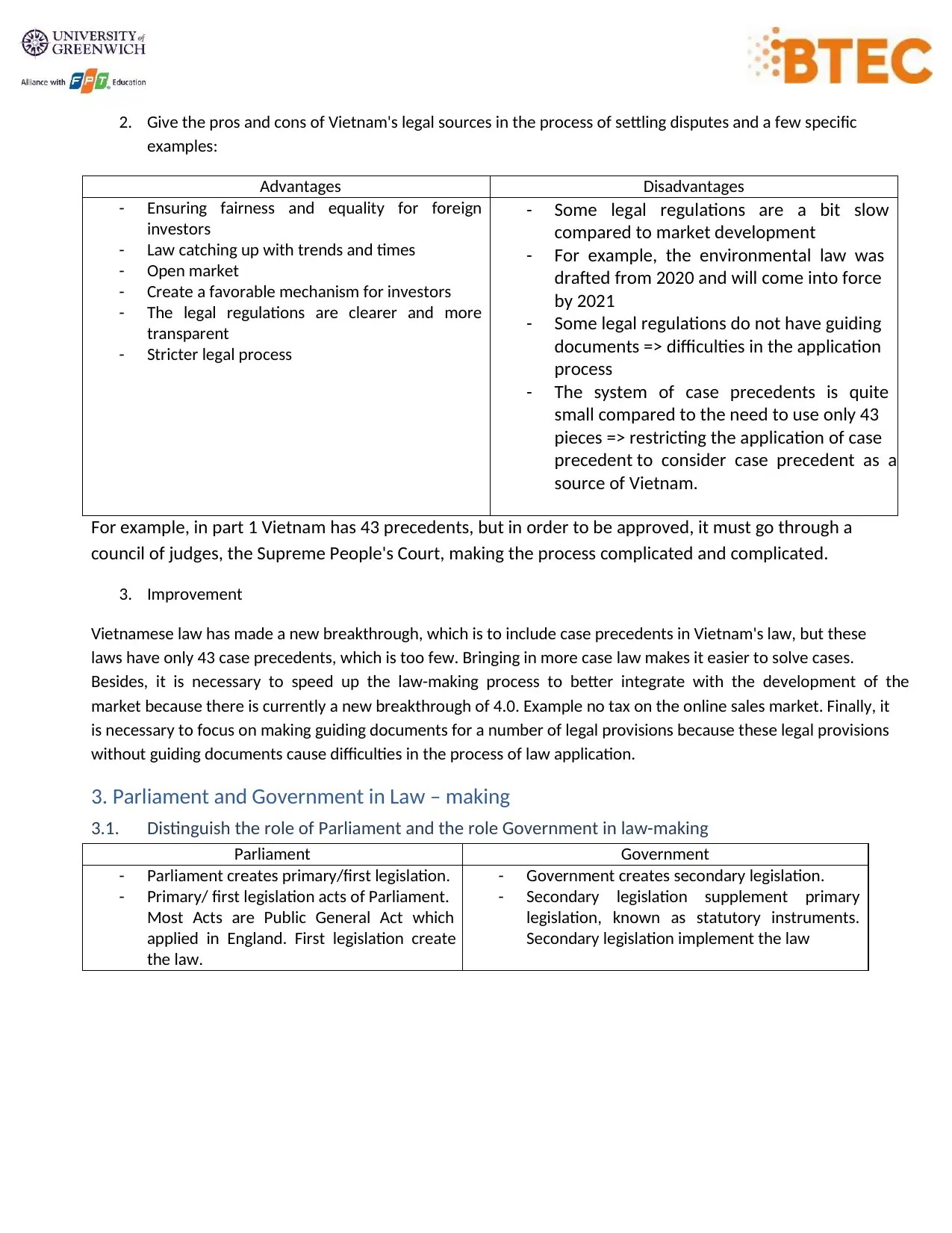
2. Give the pros and cons of Vietnam's legal sources in the process of settling disputes and a few specific
examples:
Advantages Disadvantages
- Ensuring fairness and equality for foreign
investors
- Law catching up with trends and times
- Open market
- Create a favorable mechanism for investors
- The legal regulations are clearer and more
transparent
- Stricter legal process
- Some legal regulations are a bit slow
compared to market development
- For example, the environmental law was
drafted from 2020 and will come into force
by 2021
- Some legal regulations do not have guiding
documents => difficulties in the application
process
- The system of case precedents is quite
small compared to the need to use only 43
pieces => restricting the application of case
precedent to consider case precedent as a
source of Vietnam.
For example, in part 1 Vietnam has 43 precedents, but in order to be approved, it must go through a
council of judges, the Supreme People's Court, making the process complicated and complicated.
3. Improvement
Vietnamese law has made a new breakthrough, which is to include case precedents in Vietnam's law, but these
laws have only 43 case precedents, which is too few. Bringing in more case law makes it easier to solve cases.
Besides, it is necessary to speed up the law-making process to better integrate with the development of the
market because there is currently a new breakthrough of 4.0. Example no tax on the online sales market. Finally, it
is necessary to focus on making guiding documents for a number of legal provisions because these legal provisions
without guiding documents cause difficulties in the process of law application.
3. Parliament and Government in Law – making
3.1. Distinguish the role of Parliament and the role Government in law-making
Parliament Government
- Parliament creates primary/first legislation.
- Primary/ first legislation acts of Parliament.
Most Acts are Public General Act which
applied in England. First legislation create
the law.
- Government creates secondary legislation.
- Secondary legislation supplement primary
legislation, known as statutory instruments.
Secondary legislation implement the law
examples:
Advantages Disadvantages
- Ensuring fairness and equality for foreign
investors
- Law catching up with trends and times
- Open market
- Create a favorable mechanism for investors
- The legal regulations are clearer and more
transparent
- Stricter legal process
- Some legal regulations are a bit slow
compared to market development
- For example, the environmental law was
drafted from 2020 and will come into force
by 2021
- Some legal regulations do not have guiding
documents => difficulties in the application
process
- The system of case precedents is quite
small compared to the need to use only 43
pieces => restricting the application of case
precedent to consider case precedent as a
source of Vietnam.
For example, in part 1 Vietnam has 43 precedents, but in order to be approved, it must go through a
council of judges, the Supreme People's Court, making the process complicated and complicated.
3. Improvement
Vietnamese law has made a new breakthrough, which is to include case precedents in Vietnam's law, but these
laws have only 43 case precedents, which is too few. Bringing in more case law makes it easier to solve cases.
Besides, it is necessary to speed up the law-making process to better integrate with the development of the
market because there is currently a new breakthrough of 4.0. Example no tax on the online sales market. Finally, it
is necessary to focus on making guiding documents for a number of legal provisions because these legal provisions
without guiding documents cause difficulties in the process of law application.
3. Parliament and Government in Law – making
3.1. Distinguish the role of Parliament and the role Government in law-making
Parliament Government
- Parliament creates primary/first legislation.
- Primary/ first legislation acts of Parliament.
Most Acts are Public General Act which
applied in England. First legislation create
the law.
- Government creates secondary legislation.
- Secondary legislation supplement primary
legislation, known as statutory instruments.
Secondary legislation implement the law
⊘ This is a preview!⊘
Do you want full access?
Subscribe today to unlock all pages.

Trusted by 1+ million students worldwide
1 out of 17
Related Documents
Your All-in-One AI-Powered Toolkit for Academic Success.
+13062052269
info@desklib.com
Available 24*7 on WhatsApp / Email
![[object Object]](/_next/static/media/star-bottom.7253800d.svg)
Unlock your academic potential
Copyright © 2020–2026 A2Z Services. All Rights Reserved. Developed and managed by ZUCOL.





